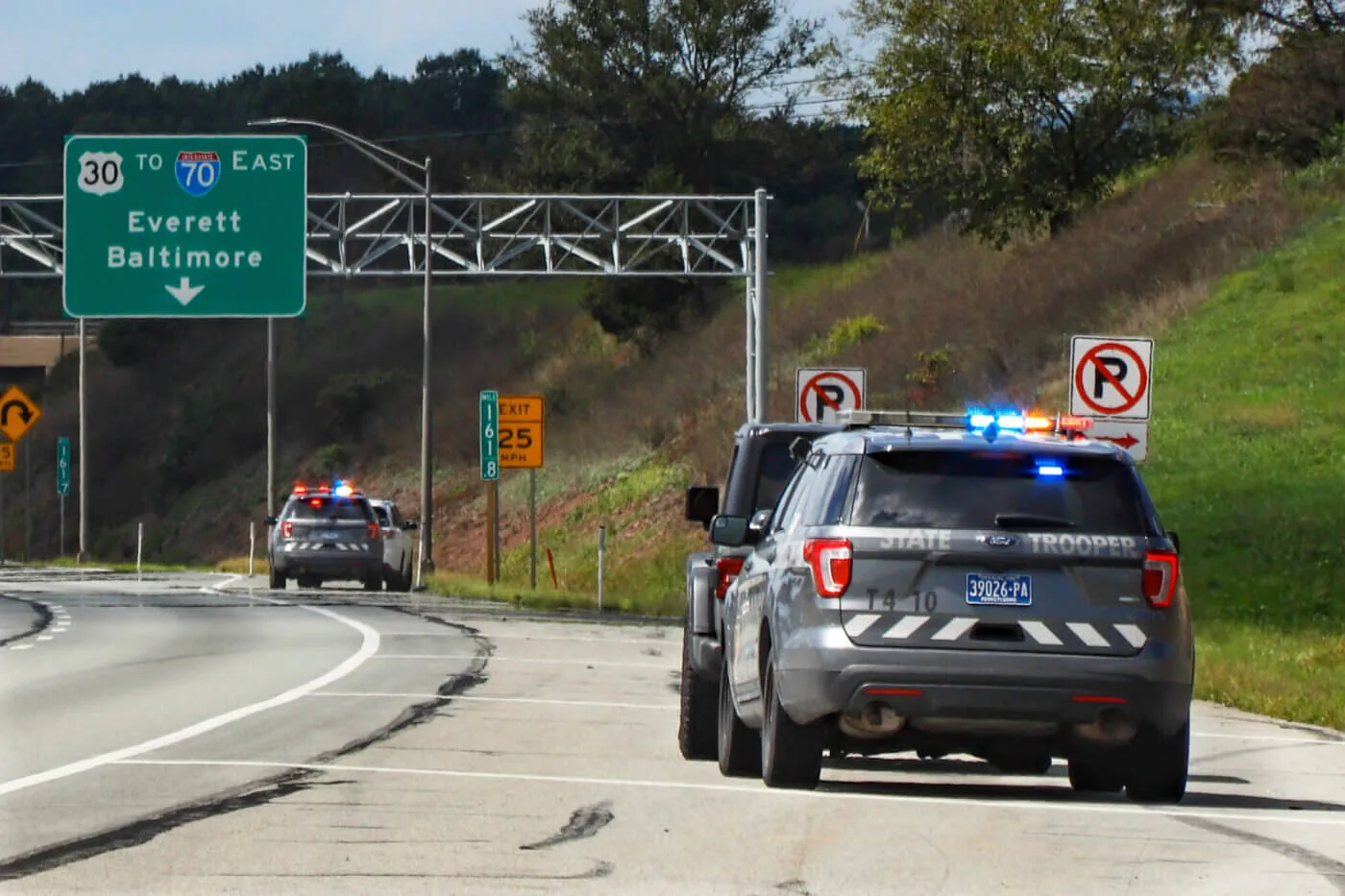
Pennsylvania State troopers pull over vehicles on Friday, Sept. 4, 2020, along the Pennsylvania Turnpike in Breezewood, Pa. Police around the country are reporting that as roads and highways emptied during the pandemic, some remaining drivers took advantage by pushing well past the speed limit. It's a trend that statistics show is continuing even as states reopen. (AP Photo/Keith Srakocic)
The ACLU accused police of aggressively questioning motorists and their passengers about their immigration statuses without cause or justification, and holding them for federal immigration officers.
Pennsylvania State Police settled a federal lawsuit alleging troopers routinely and improperly tried to enforce federal immigration law by pulling over Hispanic motorists on the basis of how they looked and detaining those suspected of being in the US illegally, officials announced Wednesday.
The settlement pays a total of $865,000 to 10 plaintiffs, with a portion going to the American Civil Liberties Union of Pennsylvania. The ACLU filed the federal suit in 2019 asserting police aggressively questioned motorists and their passengers about their immigration statuses without cause or justification, and held them for federal immigration agents.
Troopers from around the state “engaged in a pattern and practice of unlawful civil immigration enforcement that has ripped apart families, terrorized motorists, and sent a clear message to communities across Pennsylvania: the state police are in the immigration business,” said the suit, which alleged discrimination and civil rights violations.
Under the settlement, state police agreed to amend their policy to forbid troopers from enforcing civil immigration law.
“PSP does not have jurisdiction with respect to civil immigration enforcement,” the new policy language says.
Troopers may not make a traffic stop based on a motorist’s suspected nationality or immigration status, and may not ask questions about a person’s immigration status unless it’s necessary as part of a criminal investigation, according to the policy. Nor may troopers stop, search or detain someone solely based on a federal immigration detainer request.
State police had long profiled Latino residents, the ACLU claimed, but troopers’ efforts to target people without legal permission to be in the US — using alleged vehicle infractions as a pretext — accelerated in early 2017 to coincide with the Trump administration’s crackdown on illegal immigration.
“Our investigation found that the six incidents described in the lawsuit were the tip of the iceberg, reflecting a pattern of discrimination by state troopers against Latinos and people of color,” Vanessa Stine, immigrant rights attorney for the ACLU of Pennsylvania, said in a written statement.
The settlement did not require state police to admit wrongdoing. All six troopers named in the suit are still working for state police, along with a PSP supervisor in commercial vehicle enforcement who was also a defendant, according to an agency spokesperson.
One of the defendant troopers was involved in three of the incidents, according to the plaintiffs.
In one stop, the trooper pulled over a Latina woman who was driving from New York to Virginia to visit family. Even though the woman’s alleged infraction was speeding, he began interrogating her partner and adult son — who were also in the car — repeatedly demanding to see their “papers” and questioning whether they were “legal or illegal,” the plaintiffs said. The trooper put them in handcuffs and held them for hours until federal immigration agents showed up and took them to prison to await deportation proceedings, the suit said.
All of the plaintiffs still reside in the US, according to the ACLU.
“We hope our victory means that this will never happen again,” said Rebecca Castro, one of the plaintiffs and a US citizen who was stopped on the basis of her appearance, according to the suit.
State police highlighted the recent policy changes, along with mandatory training and a data collection program that began last year to capture demographic information on traffic stops in hopes of identifying potential racial and ethnic disparities in policing.
“I am confident these changes to policy and training will ensure the department is in compliance with current case law,” state police Commissioner Robert Evanchick said in a written statement.
Politics

New Biden rule protects privacy of women seeking abortions
Under the new rules, state officials and law enforcement cannot obtain medical records related to lawful reproductive health care with the goal of...

Biden marks Earth Day by announcing $7 billion in solar grants
The Biden administration on Monday announced the recipients of its Solar For All Program, a $7 billion climate program that aims to lower energy...

6 terrifying things that could happen if the Comstock Act is used to target abortion
Does 1873 sound like a really, really long time ago? Well, that’s because it is—but if Republicans and far-right anti-abortion activists have their...
Local News

Conjoined twins from Berks County die at age 62
Conjoined twins Lori and George Schappell, who pursued separate careers, interests and relationships during lives that defied medical expectations,...

Railroad agrees to $600 million settlement for fiery Ohio derailment, residents fear it’s not enough
Norfolk Southern has agreed to pay $600 million in a class-action lawsuit settlement for a fiery train derailment in February 2023 in eastern Ohio,...





